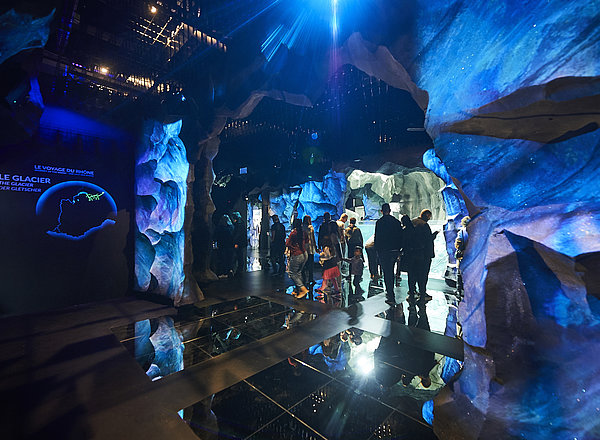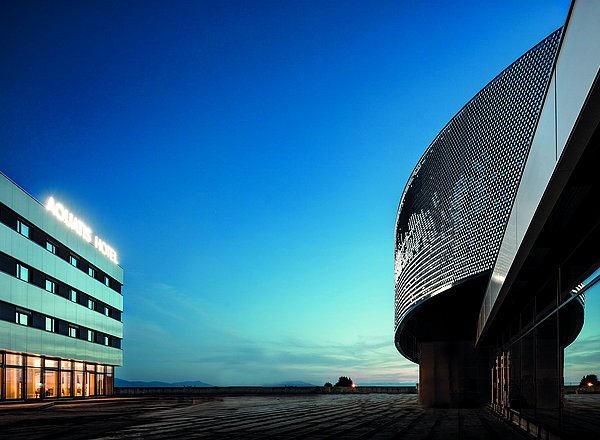A unique model
Thanks to the Foundation's many scientific partners, AQUATIS is part of a particularly dense network of life and environmental sciences. The cradle of limnology - the scientific study of continental waters, founded towards the end of the 19th century by François-Alphonse Forel - the Lake Geneva metropolis positioned itself very early on as a precursor in the field of freshwater and sustainable development.
Guided by a constant concern for openness, the Lake Geneva region today boasts many internationally renowned research institutes and universities active in the fields of life sciences, the environment and renewable energies: Ecole Polytechnique Fédérale de Lausanne (EPFL), University of Lausanne (UNIL), University of Geneva (UNIGE), Forel Institute, Natural History Museum of the City of Geneva, Cantonal Museum of Zoology, etc.
The region is also the headquarters of international organisations working for the conservation and management of nature: World Wide Fund for Nature (WWF), International Union for Conservation of Nature (IUCN), Ramsar Convention for Wetlands.
Thanks to its dynamism and the wealth of its community, the region has created an active pole both at European and international level favouring the emergence of new scientific, technological and architectural projects that contribute to the economic development of the whole region.
As the water tower of Europe, Switzerland is also a centre of excellence in the field of water resources and climate research, thanks to internationally renowned centres of competence such as the Centre for Climate Change Research at the University of Bern, the Centre for Hydrogeology and Geothermal Energy at the University of Neuchâtel (CHYN), and the EAWAG (Swiss Federal Institute of Aquatic Science and Technology).
Missions
AQUATIS is an exchange platform that promotes the protection of ecosystems and sustainable development. This vision can be seen in all the missions of conservation, research and dissemination of knowledge, in accordance with the frameworks established by :
- the International Council of Museums (ICOM);
- the World Association of Zoos and Aquariums (WAZA);
- the European Association of Zoos and Aquariums (EAZA);
- other institutions in line with the values of AQUATIS.
To preserve living collections and promote the conservation of threatened natural environments.
AQUATIS is home to animal and plant species that it has the mission to preserve and make known. By presenting these species, some of which are endangered, to the public, AQUATIS aims to convey a strong message of preservation of fragile natural environments. The presence of living species also enables visitors to understand the complex notion of biodiversity.
Develop expertise in monitoring certain species and participate in research on fresh water and its ecosystems.
AQUATIS' mission is to conduct, in partnership with other research centres, notably EAZA, studies on certain poorly documented animal or plant species.
Disseminate knowledge and participate in education on the environment and sustainable development.
AQUATIS disseminates and promotes the knowledge acquired among the scientific community through its permanent and temporary exhibitions, the organisation of conferences and through its educational activities aimed at groups and schools. It provides a showcase for scientists to promote their research and transmit it in an attractive form to the general public. To this end, it collaborates with research organisations active in the fields of species conservation, the environment, water management and international cooperation.
In addition to disseminating knowledge, AQUATIS positions itself as a true forum for society, a place for exchange and debate, and raises awareness of the issues addressed. To do this, it uses the best techniques for popularising science and spectacular staging.
An architecture
Within the framework of the construction of the complex, the concept of building physics and energy systems, designed by the consulting engineering office ER Energies Rationnelles SA, makes it possible to achieve a project that fully meets the criteria of rational use of energy and is in line with sustainable development.
The recommended materials are in line with this approach. The components of the "external skin" of the buildings have been optimised both from the point of view of thermal performance and investment costs. Similarly, the connection to the district heating network of the City of Lausanne's Industrial Services, which is based on the incineration of household waste, allows the use of renewable energy with low greenhouse gas emissions.
The cold production required for the entire complex is carried out by high-performance equipment operating with environmentally neutral fluids and optimising heat recovery. Centralized management of the platform's two buildings optimizes the synergies between two types of users while ensuring high reliability in the operation of technical equipment and increased energy efficiency.
Populations
AQUATIS is home to animal and plant species that it has the mission to conserve, preserve and make known. The species presented allow the development of management and reproduction programmes for species, including those on the IUCN (International Union for Conservation of Nature) Red List of Species. The origin of the species and the breeding programmes are studied with the utmost care, taking into consideration the welfare of the animals according to the principles dictated by the EAZA (European Association of Zoos and Aquaria) code of ethics and the Swiss law on animal protection. AQUATIS conducts its activities according to the four axes determined by these international institutions, namely: conservation of wild populations, management of these populations, education and scientific research.
Populations linked to freshwater or in danger of extinction
Plant and animal collections are developed according to the ecosystems represented and the priorities established for conservation and preservation. Along the permanent visitor route, some forty aquariums, aquaterrariums and terrariums present ecosystems of major interest thanks to reconstructed decors.
Populations include many species of fish, amphibians, reptiles and plants. These populations can be closely contemplated by the visitor. They give them access to a remarkable natural heritage as well as the opportunity to observe certain singular animal behaviours.
Small aquariums, known as "observatories", allow smaller species to be presented and focus on certain problems (for example, the invasive crayfish in Lake Geneva).
Discover also
GROUPS
Privatization, School, Tour Operators, ...
Would you like to benefit from offers adapted to your group visit to AQUATIS? We certainly have an attractive offer for you!
AQUATIS HOTEL
Families are of paramount importance in our establishment and it is important to us to offer the best services for all generations. Aquatis Hotel combines leisure, education and pedagogy.
AQUATIS RESTAURANT
We are open from 11 am to 6 pm on Wednesdays, Saturdays, and Sundays, as well as on public holidays and during school vacations. We are also open on Tuesdays and Thursdays from 11 am to 3 pm. Enjoy our terrace and fountain, and savor a varied lunch menu accompanied by a selection of pizzas.


![[Translate to English:] [Translate to English:]](/fileadmin/_processed_/4/c/csm_AQH_The-Garden16_8f1aa38eb8.jpg)